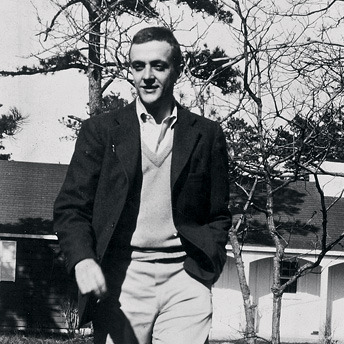The V-Boys
I just read The Brothers Vonnegut: Science And Fiction In The House Of Magic, Ginger Strand's book about the early years of author Kurt Vonnegut and his brother Bernard.
They, along with their sister Alice, grew up in Indianapolis. Kurt was the kid brother, trying to get a word in edgewise. Their German ancestry put the family in an odd position during World War I, which started just before the kids were born. A few decades later, Germany was once again unpopular, and Kurt was a pacifist. But the U.S. declared war, and Kurt would find himself fighting in Germany. And becoming a POW. (Anyone who's read Slaughterhouse-Five has an idea of his experience.)
Older brother Bernard was an academic star, earning degrees in chemistry at MIT. Kurt preferred the humanities, but his family urged him to be serious and go into science, and he all but flunked out of Cornell before the war. After the war, he went to the University of Chicago and studied anthropology. And then both he and Bernard found employment in Schenectady, New York, working for General Electric.
GE was the future. And Bernard was on the cutting edge. He's the guy who came up with seeding clouds with silver iodide to make it rain. While the discovery was ultimately of limited use, he was unhappy when it was taken over by the military as a potential weapon.
Meanwhile, Kurt worked in public relations. He didn't like the job, but he had to provide for his family. In his spare time, he wrote short stories, selling enough to eventually move on. (Placing four stories a year to big magazines could make him as much money as his job.) Some of his stories express his political views of the time--which editors, in an age of patriotism, would sometimes soften. Some of his work also expresses how he didn't fit in at GE--it's hard to miss the autobiographical elements in a piece like "Deer In The Works," about a young man applying for a job as a publicity writer in a large corporation in upstate New York, only to find the experience dehumanizing.
Kurt wanted to become a novelist--more respectable and fiscally reliable. His first published book, Player Piano, explored the idea of humanity amidst modernization and corporate culture. The book got good reviews but did not sell well--and also got Kurt the reputation as a science fiction writer, even though his plot was essentially about what was going on at the time at GE.
Not only was Kurt's family growing, but his sister and her husband died (within days of each other) and he adopted her three kids. Meanwhile, with the rise of TV, the market for short stories was weakening. He would eventually become a successful novelist (and the star of the family), but times were tough for a period. And this is where the book leaves us--with Kurt on the precipice of fame, and Bernard wondering about what he'd done.
But the book isn't simply a dual biography. It's more a skeptical look at post-WWII, full of promise and hope, but in danger of selling out. Whether or not you agree with Strand's take, her book certainly takes you into the Vonneguts' world, and helps explain how they became who they were.



2 Comments:
Does the book spend much time on Vonnegut's time at Cornell and U. of Chicago? Since those or my 2 alma maters, I might pick this up just for those chapters.
I read this book a few months ago (some posts take a while to be put up) and there was stuff about college, though I don't remember an overwhelming amount.
Post a Comment
<< Home